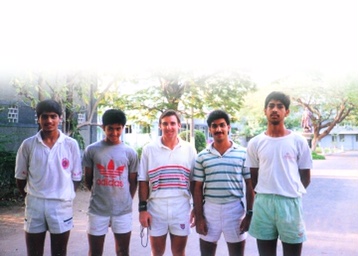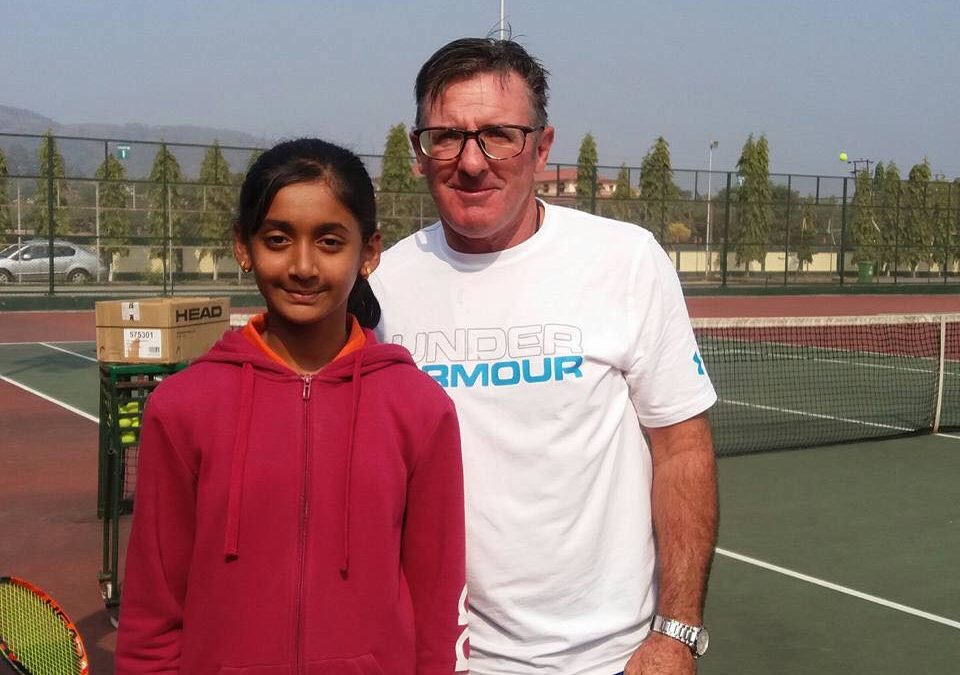Paul Dale has been in the coaching scene for decades. A New Zealander settled in Thailand and who has extensively worked in India gives him kind of a global banner. He was actively involved as a coach with Vijay Amritraj`s brainchild, Britannia Amritraj Tennis (BAT) and is still coming to India to coach Indian future hopes.
Needless to say, BAT gave India its gem in the form of Leander Paes. This extensive journey with Indian tennis has given him enough insights to share his knowledge and expertise with Tennis4India.
In an exclusive interview, Paul Dale shares his journey with Indian tennis apart from his sea of tennis knowledge.
Q: You have been associated with Indian Tennis right from your BAT days in the early 1990s up till now. Tell us how are you seeing the evolution of Indian tennis thus far?
Paul Dale: Probably the only noticeable change since I first started working in India in the early 90’s is that tennis coaching is much more accessible now. Many more “academies” and places where young players can start the game under supervision.
I wish I could say that the standard of facilities and the level of instruction is higher now, but that is not the case.
The recent rise in the rankings of many India players competing on the world stage, while fantastic to see, cannot be attributed to anything done differently in the country.
The basic formula for Indian players remains the same. Your path to the top will be essentially up to you both financially and in terms of the risks you are prepared to take
Q: Last time when I spoke to you, you mentioned that BAT has had been the best thing to have happened to Indian tennis. Why do you think so?
Paul Dale: BAT was the best thing to happen to Indian tennis.
The BAT program showed the Indian tennis community, and indeed the Indian sport community what was possible if a development program was well funded, well planned and well organized. Much credit must go to the Amritraj family of Chennai, particularly Vijay Amritraj from whom the concept was born.

Vijay Amritraj had a concept and did not make the mistake of “thinking cheap”. His high standards and those of the late Maggie Amritraj drove the program each and everyday.
It was a catalyst for a lot of other programs that came along after it.
Q: You have seen quite a bit of the current crop of Indian players including Yuki Bhambri, Prajnesh Gunneswaran, Ramkumar Ramanathan etc. How do you find their game? Where do you think that they can still improve their games within their own limitations?
Paul Dale: I have nothing but admiration for these guys. I have watched them play quite a lot over the years and India is rightly proud of what they are doing now.
It’s heartbreaking to see Yuki prove what an amazing player he is, only to suffer another injury setback that keeps him out of the game. Who knows where his ranking could go to if he was able to play continuously for a few years.
Q: You have been associated with Asian players and have also managed players like the former World No.9 Paradorn Srichaphan from Thailand. Often questions are raised about the Asian physique/ body type not having the natural ingredients compared to their European counterparts for playing professional tennis. What is your take on that?
Paul Dale: Whether it’s holding up the “Asian Physique” or the “Asian Diet”, as a reason for our relative lack of top players, for me that way of thinking is a complete myth.
We would do better to look closer to home. Our training of the players is way behind the level of what they do in Europe and other tennis powerhouses.
Using Yuki, Prajnesh and Ramkumar as examples, they were always behind the Europeans at an early age in terms of technically, physically and strategically. In terms of those 3 areas of the game they have had to play “catch-up” over recent years. In my opinion this is why Yuki is prone to injury today.
Paradorn Srichaphan was excellent physically but lagged a little technically compared to others at the top of the game during his prime.
Japanese men constantly perform poorly internationally due to short sighted technical development as juniors.
Q: You are the travelling coach of Divij Sharan. He is now a good top 50 doubles player. What are the things that he started doing differently that brought the change. Also how do you mange a by now experienced professional like Divij who knows the tricks of the trade.
Paul Dale: Divij’s secret, I feel, is his commitment over a long period of time. He has just got really good at what he does because he is an extremely committed guy who will never be accused of not getting the most out of his potential. I think all the successful Indian players are like that. It’s a part of their “success: story that is seldom seen by the rank and file players in the country.
However if you’re looking for a technical analysis. Divij’s return of serve is extremely good and he seldom puts in a “flat” performance. Committed and methodical, a perfect role model for Indian juniors!
As a coach there is always something to work on with players no matter at what level. The difference when working with top players is that you can’t make mistakes! It is their career you are tinkering with.
Divij and I have tried to improve some key areas in his game. I’ve tried to do this without having his game adversely effected too much and causing his ranking to drop.
Q: Also when you are travelling as a coach with Divij and if his doubles partner travels alone do you often end up doing a coaching job for both?
Paul Dale: The aspect which is most difficult is when each player has their own coach. It’s a tricky scenario on the practice court as to which coach leads the direction of the practice. Every coach has a different perspective and usually on the ATP Tour each coach is there because they have earned the right to be there.
Generally it’s better to have one coach controlling the team rather than two coaches involved at the same time.
Q: If you are made as a coach of the top Indian Juniors what are a few things that you would do so that they end being successful professionals on the tour?
Paul Dale: That’s a great question!
I would train them as a team. Travel frequently as a team to tournaments. Enlist the experience of players like Yuki, Leander, Rohan and Divij to mentor them.
Protect them from external politics so they could simply perform as tennis players
India should have been doing this for years already. So many great players who have had to learn everything the hard way. Indian tennis should be using those guys I mentioned to help educate Indian juniors on new developments. Doubles has changed dramatically over the past few years because of the new scoring system. I wonder whether Leander or Divij has sat with a room of juniors or even coaches recently and explained where the doubles game has changed? Surely that would be valuable.
Q: You have been following Indian players closely and you also keep on coming to India for your coaching stint. What do you have to say about our young kids? Do they impress you?
Paul Dale: Yes, they are great students. Any problems regarding developing into top players is certainly nothing to do with having a poor attitude or work ethic
Q: With all fairness to our doubles players who are flying the Indian Tricolour high, do you think it suits our game style of good quick hands backed by lesser work load and physicality?
Paul Dale: Another myth. Indian players excel at doubles because singles involves greater court coverage, stamina and is overall slightly more demanding
It goes back to when you develop as a junior. If you don’t develop fully as a junior you have to make up for it later. Often players just run out of time so they revert to doubles because its less demanding
Q: Modern tennis players are still going strong in their thirties. Have these countries done something extraordinarily different of late in terms of diet and fitness that Indians have fallen further behind?
Paul Dale: More advanced knowledge of training methods, proper diets and better techniques are prolonging careers.
I think today it’s not about how hard you train but how smart you train. The phrase we used to repeat “No pain, no gain” hurt so many careers in the long term. I’ve noticed over the years that retired sportsmen and woman maintain a healthy lifestyle even after competing. The habits they created while competing are continued later.
Q: Tell us some of your wonderful experiences that you have had in India in this long journey of yours right from your BAT days.
Paul Dale: The stories are too numerous to even attempt to mention here. Whenever BAT players meet the story telling starts. The bond between the BAT players is quite special.
I will say however that I have been able to stay in touch with many of the “boys” over the years. They have all done really well in their lives and it’s a credit to the Amritraj family and the many coaches who worked in the program. Everyone involved should take some credit for the amazing young men that came out of BAT.
I was speaking to one ex BAT boy a few years ago and he said to me “Sir, after BAT I felt I could achieve anything in life. After BAT everything else was easy”


Recent Comments